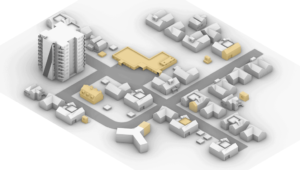iZone’s School Choice Design Challenge Demos Tonight

In 2010, the NYC Department Of Education launched the Innovation Zone (iZone), an Office dedicated to exploring Innovation that would support New York City’s public school students in personalizing learning to accelerate college and career readiness. We’ve blogged about before in NYC iZone: Innovation Hub and Change Management Model. The iZone program launched the 3 years ago with 81 schools and focused on quickly identifying, piloting and applying innovative strategies to education challenges. This school year, iZone has grown to now include 300 schools.
This week we talked to Executive Director, Steve Hodas, whose iZone role is to serve as the interface between the office and the education entrepreneurs, finding new ways to solve old problems with a focus on personalizing learning for students. In the past few years, the iZone has sponsored prize winning competitions, bringing developers and vendors into conversations with teachers and students with the intent of working together to find innovative solutions to problems that have plaguing New York classrooms. Last year, the first of these challenges, The Gap App Challenge, launched to help find and create apps to fill the math achievement gap that exists for so many middle schoolers in New York. In the second challenge, iZone partnered with Spotify for the first Music Education Hack and brought together educators, developers and the music industry to produce over 40 music education tools in just one day.
Tonight, NYCDOE and the iZone office “celebrate the culmination” of their third ambitious design challenge, The School Choice Design Challenge, to help make school better for New York City’s students. Each year in New York City, nearly 80,000 eighth-grade students apply to high school, choosing from more than 700 program options. 75% of students are accepted to one of their top 3 choices. Parents and students love the ability to pick the high school program from any where in the city that best fits their learning needs. The only negative aspect to this policy is the process families have to work through in order to get accepted to the high school of their choice. The anticipation of school choice is valued, the end result is considered a success- it’s just the “getting there” that is so stressful on students and their parents, right now.
Together with the Public Policy Lab and the Office of Student Enrollment the iZone brought together all the stakeholders- educators, students, parents, policy makers to have the conversation and come up with their own ideas around how to ultimately make the process of choosing a high school better for New York families, particularly low-income and non-English speaking families.
The team then spent months of time inside the schools, experiencing the process first hand. Really, until not too long ago families could only find the information about the different high school programs in a big “phonebook-like” book that listed every one of the 700 schools in detail. For this challenge the DOE created it’s first public API so that all data would be accessible in it’s most raw, usable form and app developers could create anything they desired using all that open data. Hodas says, “Open data is letting the genie out of the bottle – we are not the owners, but the custodians of the data and we can do so much more good when we let the solution makers use it.”
Tonight’s Demo Night will be a very powerful event at which 6 new apps will be unveiled and then voted on by a panel of 9th graders. The developers will offer the tools for free and have agreed to keep them open to the public for at least 18 months. The event itself is sold out. But the final intent really isn’t to determine one winning tool. Steve Hodas and the iZone realize better solutions arise by approaching the problem with humility. It is better to make “lots of small bets.” There is no silver bullet, no one answer or one app that works for all. We need to put 20 apps out in the world, see how people use them and take direction from there.
The School Choice Design Contest tools that make their debut tonight night will be highly focused on the user experience and, most importantly, give the users the voice needed to contribute to the solution. The iZone challenges are creating relationships between the organizations and the people they serve at the very heart of the experience and the ripples of these solutions that travel out from the challenges are much farther reaching than ever expected.
See the press release below.
NEW YORK CITY DEPARTMENT OF EDUCATION UNVEILS APPS FROM THE SCHOOL CHOICE DESIGN CHALLENGE
The Schools Choice Design Challenge Offers New Software Applications for New York City Students
Apps to bolster information-sharing for High School Admissions Process
The New York City Department of Education today will unveil the results of the first School Choice Design Challenge (SCDC), a competition for software developers to design applications that will assist students and families during the high school choice process. The apps help families search and navigate the high school directory to find the schools right for them. Each of the six developers were given a $12,000 stipend for their participation in the challenge.
The Department of Education launched the challenge in September by recruiting technology companies to develop user-friendly applications in just two months. The Public Policy Lab, a non-profit organization dedicated to improving the design and delivery of public services, conducted research through structured feedback sessions with students, parents and educators. Participants provided insight on their experiences with the high school admissions process, as well as recommendations to improve family engagement. In addition to these findings, developers were given access to the Department of Education’s extensive data on over 400 high schools. The six participating companies then each used this information to create a unique software application to enhance the high school admissions experience.
“High school admissions? Now there’s an app for that, because we continue to be on the cutting edge of innovative solutions to support students, families and schools,” said Schools Chancellor Dennis M. Walcott. “We’ve worked to develop extraordinary public-private partnerships in our schools, and now we’re doing it for our high school admissions. It’s just another example of our top-to-bottom transformation of City schools.”
“This competition took what we’ve learned from our previous software challenges—the value of keeping the users in mind throughout the design process, recruiting innovative companies, and gathering feedback from school communities—and builds upon it by offering open data on our schools,” said Deputy Chancellor David A. Weiner. “It’s exciting and inspiring to see the incredible outcomes of our collaborative efforts.”
Each company has committed to maintaining their application and adding new data for at least 18 months, and all applications are available free of charge to families citywide. The program is funded through a Federal Investing in Innovation grant, with additional charitable support from Amazon Web Services and Rethink Education, a New York–based investor in educational technology.
The SCDC marks the debut of the Department of Education’s first public Application Program Interface (API), an online site with public school data accessible to software developers, researchers, and other stakeholders, which can then be used to create more applications and spur additional research, and innovation. The Department plans to make more data available through the API, adding to numerous existing platforms that distribute information. Go to nyc.gov/doe and search “API” for links to the applications, the school data, and explanatory documents.
The six software companies participating in the SCDC include FindtheBest, InsideSchools, Noodle, Unigo, Admitted.ly, and Vital.AI. While these applications help families research DOE schools, they are not official DOE applications and Developers own all rights to their products.
###
Contact: Erin Hughes / David Peña (212) 374-5141







0 Comments
Leave a Comment
Your email address will not be published. All fields are required.